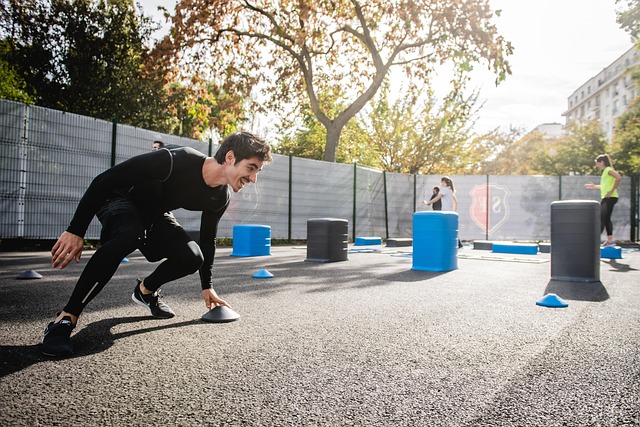Holistic life coaching promotes regenerative living by guiding individuals towards rebuilding their physical, mental, and emotional health while revitalizing the environment through sustainable practices. This approach integrates mindfulness and self-care, focusing on nutrition with whole foods, regular exercise, and stress management techniques. By emphasizing these key aspects, holistic coaching empowers people to cultivate resilience, enhance well-being, and build a supportive community for a more vibrant, fulfilling life.
“Discover the power of a regenerative lifestyle—a holistic approach to building resilience and vitality. In today’s fast-paced world, learning to thrive involves nurturing your mind, body, and community. This article explores effective strategies through holistic life coaching, focusing on mindfulness, self-care, nutrition, movement, and community support. By integrating these key elements, you can unlock your adaptability and foster a resilient, vibrant life. Let’s embark on this transformative journey together.”
- Understanding Regenerative Living: A Holistic Approach
- The Role of Mindfulness and Self-Care in Building Resilience
- Nutrition and Wellness: Fueling Your Body for Vitality
- Movement and Physical Activity: Unlocking Adaptability
- Creating a Supportive Community: Nurturing Resilience Together
Understanding Regenerative Living: A Holistic Approach

Regenerative living is a holistic approach that focuses on rebuilding and revitalizing our bodies, minds, and the environment we inhabit. It involves embracing practices that nurture our overall well-being, encouraging a deep connection with nature, and fostering sustainable habits in daily life. This way of living goes beyond mere survival; it’s about thriving and creating a balanced ecosystem within ourselves and our communities.
Holistic life coaching plays a pivotal role in guiding individuals toward this regenerative path. Coaches help clients identify areas of their lives that need renewal—be it physical health, mental clarity, or emotional resilience. By offering personalized guidance, they facilitate the development of sustainable lifestyle practices such as mindful eating, stress management techniques, and nature-based therapies. This comprehensive approach ensures that every aspect of a person’s life contributes to their overall regeneration and vitality.
The Role of Mindfulness and Self-Care in Building Resilience

In today’s fast-paced world, building resilience and vitality is more crucial than ever. A key component in this process involves integrating mindfulness and self-care practices into one’s daily routine. Holistic life coaching emphasizes the importance of these techniques as powerful tools to navigate stress and foster a sense of well-being. By cultivating mindfulness, individuals can enhance their awareness, making them more attuned to their thoughts, emotions, and bodily sensations. This heightened awareness allows for better management of stressors, enabling people to respond instead of reacting impulsively.
Self-care, on the other hand, is an active process of nurturing oneself physically, emotionally, and mentally. It involves setting boundaries, engaging in activities that bring joy and relaxation, and prioritizing one’s needs. When incorporated into a holistic lifestyle coaching framework, mindfulness and self-care become cornerstones for building resilience. They empower individuals to approach life’s challenges with clarity, equanimity, and a profound sense of inner strength, ultimately leading to enhanced vitality and a more fulfilling existence.
Nutrition and Wellness: Fueling Your Body for Vitality

In the pursuit of a regenerative lifestyle, nutrition plays a pivotal role in building resilience and vitality. A holistic life coaching approach emphasizes nourishing your body with whole, unprocessed foods rich in essential nutrients, antioxidants, and fiber. This means incorporating diverse fruits, vegetables, lean proteins, healthy fats, and whole grains into your diet to support optimal bodily functions and strengthen natural defenses. By prioritizing nutrient-dense meals, you fuel your body’s ability to repair, regenerate, and maintain balance internally, which is crucial for overall vitality.
Wellness practices extend beyond the plate. It involves adopting a mindful relationship with food, staying hydrated, and prioritizing adequate rest. Holistic life coaches encourage individuals to listen to their bodies’ unique needs, ensuring proper digestion and absorption of nutrients. Additionally, stress management techniques such as meditation, yoga, or deep breathing exercises are integral to wellness, as chronic stress can negatively impact nutritional absorption and overall health. Embracing these holistic practices cultivates a sense of equilibrium, fostering resilience in the face of life’s challenges.
Movement and Physical Activity: Unlocking Adaptability

Incorporating regular movement and physical activity into your daily routine is a powerful tool for building resilience and vitality, as recommended by many holistic life coaches. Exercise isn’t just about achieving physical fitness; it’s a key component in unlocking our adaptability and preparing us to navigate life’s challenges with grace. When we move, our bodies release endorphins, often referred to as ‘feel-good’ hormones, which can reduce stress and improve overall well-being.
Whether it’s a brisk walk, yoga, or an intense workout, physical activity encourages the body’s natural regeneration process. It strengthens muscles, enhances cardiovascular health, and improves mental clarity. By consistently moving our bodies, we cultivate a deeper connection between mind and body, allowing us to better respond to stressful situations. This adaptability is essential in fostering resilience, ensuring we can bounce back from setbacks and embrace life’s ups and downs with vitality.
Creating a Supportive Community: Nurturing Resilience Together

Building a supportive community is a powerful way to foster resilience and enhance vitality in our daily lives. In today’s fast-paced world, connecting with like-minded individuals who share similar goals can be transformative. Holistic life coaching often emphasizes the importance of community as a cornerstone for personal growth. When people come together, they create a web of support where members encourage and motivate each other to embrace a regenerative lifestyle. This sense of belonging can significantly contribute to an individual’s ability to navigate challenges and cultivate long-lasting well-being.
Through group discussions, shared experiences, and collective problem-solving, community members learn from one another, gaining valuable insights into building resilience. They discover practical ways to cope with stress, adapt to change, and promote self-care. This mutual support network can be particularly beneficial for individuals seeking to adopt healthier habits or those dealing with life transitions. By nurturing resilience together, communities foster a sense of empowerment, allowing members to embrace a more vibrant and fulfilling holistic life coaching journey.
By integrating mindfulness, nutritious diets, regular physical activity, and supportive communities, individuals can embrace a holistic life coaching approach to build resilience and vitality. This regenerative lifestyle supports not just physical health, but also mental and emotional well-being, fostering adaptability in the face of challenges. Embracing these practices allows us to thrive, not just survive, in an ever-changing world.
